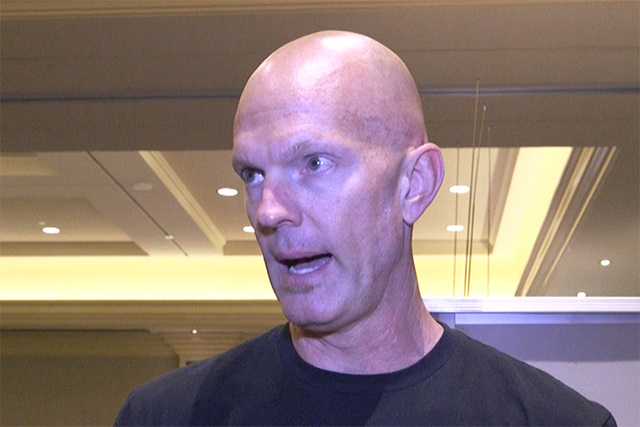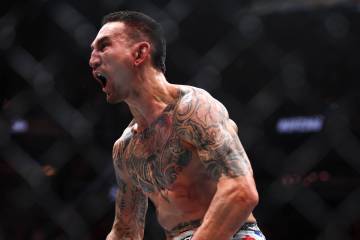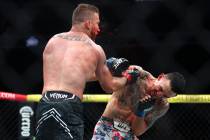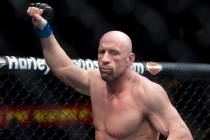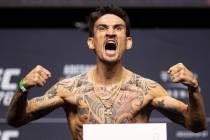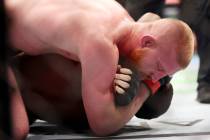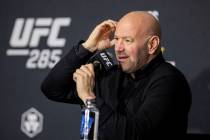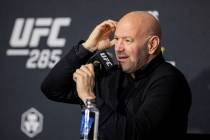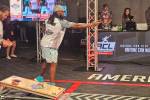UFC’s Athlete Summit a learning experience for fighters
It’s difficult to imagine Ultimate Fighting Championship light heavyweight Gian Villante being anything but a class clown back in his school days on Long Island.
The Hofstra alum was quite studious as he sat in on the organization’s Athlete Summit at Green Valley Ranch on April 4, however.
“Any day you can get better at something, you try to take advantage and I think I got better today,” he said after a pair of morning seminars that included a lecture from United States Anti-Doping Agency officials and a speech from a noted sports psychololgist. “You can train your physical stuff all the time and get jacked up and I love doing my pushups in the morning, but if you can train your brain, it can make you train smarter.
“I definitely had a flashback to sitting in school. I took notes and everything. I was really into the (sports psychology talk) and really scared about the drug stuff. I feel like I learned a lot.”
The organization used to bring in nearly the entire roster once a year for similar sessions, but found the messages were better received in smaller groups. About 40 fighters were in the group that attended the summit on April 4-5.
“What we found, much like college and high school, is that the bigger the classroom got, the less intimate the learning experience. Last year, we built these with smaller settings and this summit will mean we have passed through 100 of our next-generation athletes who haven’t previously experienced a summit,” UFC vice president of public relations Dave Sholler said. “We found the more intimate experience and hands-on training left a lasting impact. The group today represents one of our most diverse from an international perspective as we have five languages represented. So we continue to make an investment in our athletes.”
The early part of the day was dominated by talk about the organization’s anti-doping policy, which is independently administered by USADA.
Fighters were reminded about the random testing program that was put in place last year. USADA is expected to administer 2,800 tests per year, which works out to about five or six per athlete on the roster.
While a certain percentage is just going to flat-out cheat, much of the discussion centered on less sinister ways fighters can find themselves in trouble.
LaDonna Reed, USADA’s Olympic Education Specialist, mostly focused on supplements during a lecture that detailed the process for fighters to check on the legality of over-the-counter products they ingest.
One of the big takeaways was that there are no guarantees in the largely unregulated world of supplements.
Reed and Jeff Novitzky, the UFC’s vice president of health and performance, detailed cases of mislabeled and tainted products that have caused positive tests and lengthy suspensions.
Novitzky, a former enforcement official for the government who gained fame in the Barry Bonds and Lance Armstrong cases, hopes the fighters got the message about knowing what they are taking.
(It) would be the safest (to not use supplements),” he said. “It’s not reality though. Athletes are going to take supplements. I think a well-balanced nutritional diet is good, but when you get to areas of convenience you don’t always have time to come home and cook a balanced meal and supplements do have a role there. I don’t think it’s realistic that they would stop.
“But in my role as a special agent with the FDA, I saw that hundreds of times where dangerous, prohibited in sport items were not listed on the label as a result of both contamination and in some cases companies purposely spiking it unbeknownst to the consumer with the thought that they can throw a steroid in there and not put it on the label and the consumer will get the desired effect and not have it on the label. It’s very common especially in the sport supplement industry.”
The message wasn’t all gloom and doom.
Trevor Moawad, a sports psychologist who has worked with the football teams at Alabama and Florida State as well as NFL quarterback Russell Wilson, spoke to the fighters about the power of the mind.
“I try to help them to understand that if you don’t become helpless, you don’t become hopeless,” he said afterward. “Being able to control your circumstances like, ‘I can make this decision with regards to how I eat. I can make this decision about what I do.’ You’d be surprised how many people give up that control because they’re down in a fight. They’re down in a match, they’ve lost three in a row, they’ve been knocked out three straight times. You lose to Ole Miss in the fourth game of the season. Those circumstances are real and they’re tough. How are you going to go forward? I think that’s the challenge and to me I think there’s a way you can quantify it. There is a way to think and communicate to yourself that’s as strategic as Pepsi or Coke would create in a commercial. Whether you are planning it intentionally or not, that’s the difference.”
Moawad said he found the audience quite receptive to what he was saying. Villante was certainly impressed.
“The mental part is so big and I learned so much today,” he said. “You can have the biggest arms in the world and still not win every fight. It’s something we don’t think enough about in training. Alabama does it. Russell Wilson does it. Why can’t Gian Villante do it?”
His close friend and training partner, former middleweight champion Chris Weidman, has spoke often about the importance of mental training.
Villante said it’s different hearing it from an outside perspective, however. He said Moawad’s speech made him think back on some of his past mistakes.
“There are times when you’re walking to the cage and thinking, ‘This is really going to suck if I get knocked out in front of all these people.’ It’s the worst thing you can be thinking about,” he said. “Walking out, if I can just think, ‘This is going to be so great to knock this guy out and watch all the fans go nuts,’ it would make a big difference. Sometimes that’s tough. So I would say think positive thoughts and don’t let the negative ones be so loud.”
Moawad felt the entire day of activities would benefit the fighters.
“I think it’s awesome,” he said. “I think you should look at it in terms of the lottery. You could win it with 10 tickets, but you have a much better chance with 100 tickets. I think what the UFC is doing is giving guys more tickets, giving them a better chance to succeed for a longer period of time. Look, the guys can make it not doing any of this stuff and I’m sure there are examples of guys who have done it without training well, eating well, sleeping well and all of that. But you have a better chance if you do the types of things UFC is providing for their athletes at this summit.”
Novitzki is proud of the information the organization was sharing with the athletes and how much education is a part of the UFC’s anti-doping program.
“The athletes have been very receptive. I’m often asked whether MMA, and the UFC specifically, have a problem with performance-enhancing drugs and I always answer that in my previous career I saw PEDs pervasive across sports,” he said. “There wasn’t a sport untouched. So I don’t think it’s any different. What is different is the importance. You’re not talking about how many times you hit a ball over a fence or how fast you race up a mountain, you’re talking about two individuals in an octagon strength on strength and stamina on stamina. They all realize and appreciate the importance. The approval has been overwhelming.”
Villante was at the head of the class, though he did take full advantage of a mental exercise about distraction and concentration to take his shirt off and whoop and holler to roars of laughter.
His class clown status is still safe.
Contact reporter Adam Hill at ahill@reviewjournal.com or 702-224-5509. Follow him on Twitter: @adamhilllvrj



